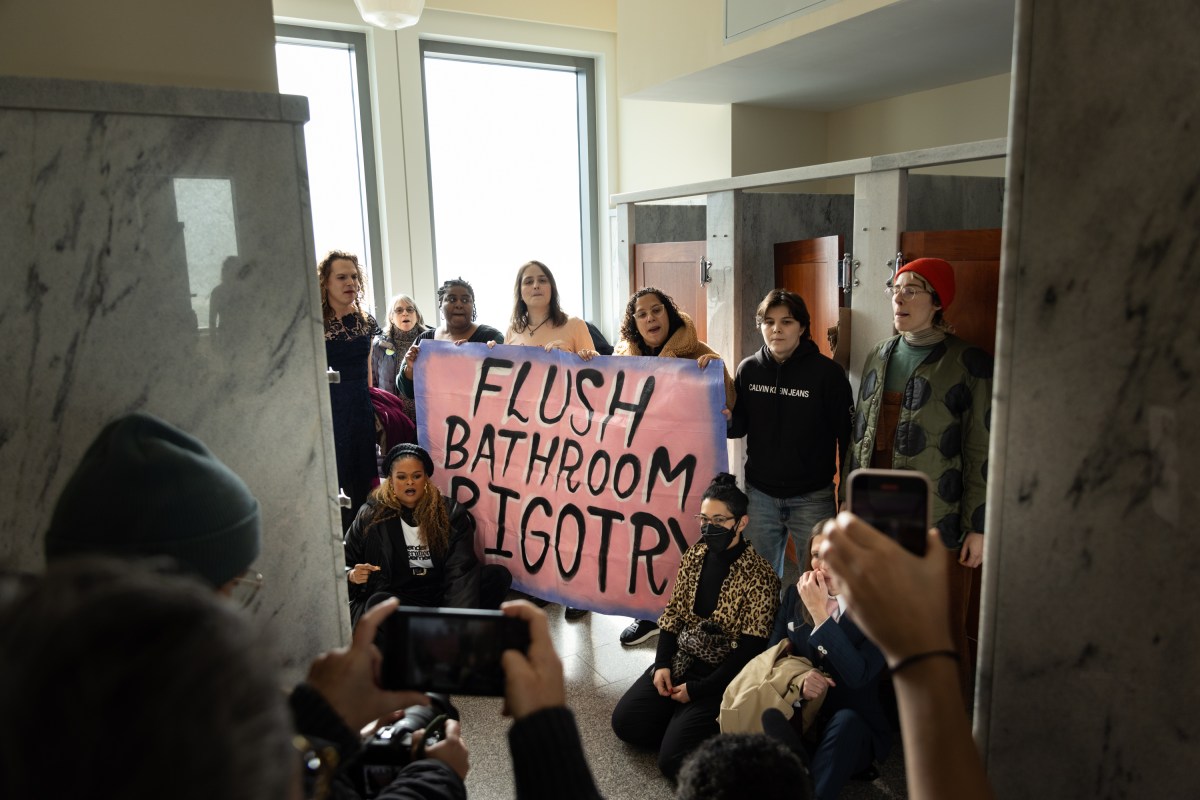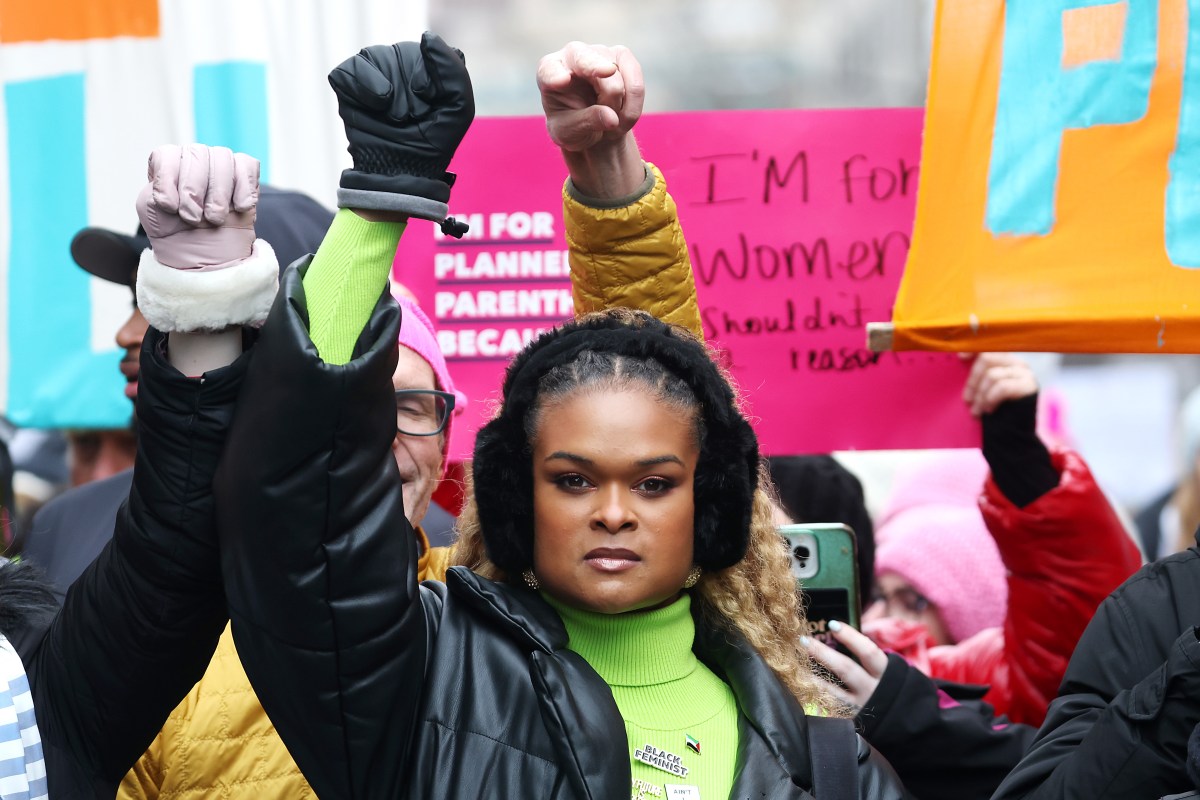
Photo by Jemal Countess/Getty Images Women’s March
Even before President Trump and his administration took office, it felt as if there was a new legislative attack on the bodily autonomy of women and trans people happening every day. His and his administration’s ascension to power has only begun to expedite, encourage, and increase their frequency, leading many people wondering what they should do in response and looking for ways to fight back. One new organization — the Gender Liberation Movement — is building a coalition to battle these attacks against LGBTQ+ people and women through media campaigns, direct action, and community empowerment.
“We’re building a people’s movement that champions bodily autonomy and self-determination, collectivism, and the pursuit of fulfillment,” says Eliel Cruz, co-founder of GLM and Director of Communications for the organization. “What that means is that we believe every single person has a right to make choices about their body and about their future, and that we have a responsibility to one another and that we should all have every resource we need to live long, fulfilling, joyful lives filled with pleasure.”
Currently based in New York City, GLM is a “is an emergent and innovative grassroots and volunteer-run national collective that builds direct action, media, and policy interventions.”
According to Cruz and co-founder Raquel Willis, the idea for GLM began coalescing following both of their involvement in the planning and execution of the Brooklyn Liberation Marches of 2020 and 2021. When it became obvious early last year that a similar, more large-scale action was necessary to combat some of the narratives about both reproductive health and gender-affirming care that were popping up in the media and in the Supreme Court, Cruz, Willis, and other organizers began planning the Gender Liberation March on Washington, D.C. On September 14, 2024, the march was successfully executed, and “Thousands of folks showed up in the nation’s capital to really protest against Project 2025, but also to let the world know that we weren’t going to accept these efforts to restrict the rights of people on the margins,” says Willis, who was recently named one of Time’s Women of the Year for her activism and advocacy work for trans liberation.
As the election was called in Trump’s favor in November, Willis, Cruz, and other organizers recognized the need to continue harnessing the energy and power from the Gender Liberation March earlier in the year. In response to Representative Nancy Mace’s introduction of a bill that would prevent trans people from using the bathrooms of their choosing in federal facilities, Willis, Cruz, other members of GLM, and other trans organizers like famous whistleblower Chelsea Manning planned and executed a sit-in protest in the congressional bathroom nearest House Speaker Mike Johnson’s office in early December. At the protest, Willis, Cruz, Manning, and 15 other participants were arrested, which was, according to Cruz, the first time either of the GLM co-founders had “ever been arrested for a direct action.”

Gender Liberation Movement protest in the House Cannon building and face subsequent arrests on December 5, 2024 in Washington, DC.
Photo Credit: Maansi Srivastava for The Washington Post via Getty Images
After that day, it became clear to both Willis and Cruz and their fellow organizers that something more permanent and concrete needed to be established. Cruz explains that in January of this year, they finally decided to announce GLM as an organization with plans to continue growing not just in terms of their plans for direct action, but also in terms of how they will continue bringing people together and what they want to do as an organization in the future. Willis says, “It felt necessary to become an organization. We had a lot of interest from our collective and coalition partners around continuing to make these connections between various movements, including the Movement for Black Lives, the LGBTQ+ movement, and the larger feminist movement. And I think it was right on time as we started to see these executive orders come down from the Trump administration, it became clear that these attacks restricting the rights of trans folks dovetailed with the attacks on diversity, equity and inclusion efforts, as well as the attacks on workers and the attacks on migrants. So, it only made sense for us to continue building.”
Cruz explains further, “Originally, the march was going to be a one-and-done thing we did as an attempt to say, ‘Hey, we’re bringing these efforts together. We want to name that these are the same attacks, that those who make these attacks are the same actors, and that we must also make these connections as a movement.’ In the planning process of that march, we realized we fit a very unique space and wanted to continue to grow into a full-fledged organization.”
Since January, Willis, Cruz, and other GLM organizers have been working to build an organization that not only “responds to the attacks that we’re seeing around gender” but also helps change the way people discuss gender, reproductive health, gender-affirming care, and how we can move forward to help build a world where these attacks on our rights to bodily autonomy and self-determination are no longer a threat. Both Cruz and Willis have backgrounds in communications and political activism, and Cruz describes himself and Willis as “straddling the line between the media and organizing work,” which has helped them both lay the foundation for an organization that has a vested interest in using the media to help push their messages forward. In its beginning few months, and for the foreseeable future, GLM is focused on “media advocacy, narrative change, direct action, and cultural events, as well as policy innovation,” according to Willis. This means working to shift the narratives in the mainstream media about trans lives, the necessity of gender-affirming care, and what families can do to uplift and support their trans children.
Willis explains, “I always see the necessity of us elevating the lived experiences of trans folks and other folks impacted by gender-based attacks in authentic ways. Unfortunately, mainstream media has largely failed at elevating authentic trans voices. It’s not uncommon, for instance, for the New York Times to have an article about the trans community without featuring any of our voices or using the most bad faith actors as sources about the trans experience. There’s no accountability for journalists and outlets that platform far-right, Christo- fascist organizations […] So we understand the necessity of being able to call out these mainstream outlets and others when they fail, but we’re also creating our own kind of radical newsroom that will produce content that is values-aligned for us. And we need that.”

TIME Women of the Year Gala (Photo by Stefanie Keenan/Getty Images for TIME)
Although media advocacy is currently a focus of the organization, Willis and Cruz tell me their work in policy innovation and community organizing hasn’t taken a backseat in any way. During our conversation, Willis and Cruz brought up how organized the far-right is in terms of its policy proposals and plans for the future of the country. If you look at a document like Project 2025, for example, “for however evil it is, it is a very well-thought-out political document and road map for people,” Cruz says. There is a clarity of purpose and a clarity of vision that is extremely obvious and makes it easy for people to rally around it. Cruz says, “We feel that leftists and Democrats do not have the same type of packaged North Star policy proposal.” In response to this, one of the goals of GLM — and something they’re actively working on — is to create an “antidote” to Project 2025, what Willis describes as “a guiding policy platform that brings together not just trans issues, but a broader range of issues impacting everyone from economics to safer schools to access to healthcare and beyond that is a longer term plan. A lot of our work right now is focused on really trying to keep folks engaged in keeping our people safe and keeping our people alive.”
In that vein, GLM is also actively engaged in doing work that helps bring resources together for queer and trans people, their families, and for people who want to help shift the way we talk about gender and fight for the liberation of all people regardless of how they identify. Willis tells me that GLM is currently launching an Affirming Adults Circle for adults, parents, and guardians who “want to defend and protect trans youth and share resources and empower each other” as well as an Empowered Youth Circle for trans youth and youth organizers that serves as “an autonomous youth space for resource sharing and empowerment.” These initiatives also extend beyond their homebase in New York City to the broader U.S. by hosting mass calls over the internet through their website and social media spaces every other month. “We’re hosting a mass call every other month that serves as a place for, as a first site for people who are interested in GLM’s work, but maybe aren’t sure where to plug in,” Willis explains.

Raquel Willis participates in the “People’s March on Washington” January 18, 2025 in Washington, DC. (Photo by Scott Olson/Getty Images)
As for the future of GLM’s work, they want to continue protecting the communities who are most threatened by these ongoing attacks while also ensuring that people everywhere understand their experiences aren’t all that different from the marginalized people they’re rallying against. “GLM will always center trans and queer experiences, because we know that these communities are the most under attack when it comes to gender-based threats,” Willis says. “But our hope is to focus less on this kind of idea of trans visibility and to move into a frame of gender liberation for all. Trans visibility has done some things in terms of elevating different voices and platforms for largely individual trans people, but it hasn’t shifted the material conditions of most trans people. And I think cis people have been mobilized against the trans community. The right has figured out how to use that increasing visibility over the last decade or so in their favor. I think also, cis people need to understand that they are also having a gender experience and that they are also facing restrictive gender notions. When I look at, for instance, the executive order defining male and female, I don’t just see the erasure of trans and intersex people from public life. I also see the reduction of cisgender people to their reproductive capabilities. And that is dangerous. There’s been a long fight within feminist movements to move away from reducing women to their ability to give birth and their existence as sexual objects. So when I’ve seen TERFs, lauding these executive actions, it tells me that we have a lot of work to articulate that they are also enemies to everyone’s bodily autonomy.”
Willis, Cruz, and other members of GLM are hoping that people who want to get involved will get in touch with them via their email, [email protected], or follow their social media presence on Instagram, X, Facebook, and YouTube to find out more about their community organizing events, mass calls, and volunteer opportunities. Cruz adds, “If folks want to help us scale up, becoming a donor at whatever amount that looks like would be one of the most supportive ways that they can support GLM right now.”



Thank you for reporting on this!
Its lovely. Thanks